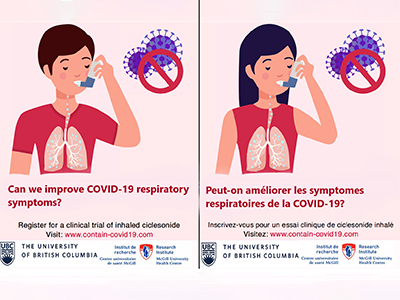
Researchers are investigating whether a readily available medication could speed up recovery of COVID-19 symptoms that can lead to hospitalization.
With several treatments now available to care for the most urgent and severe cases of COVID-19, researchers are setting their sights on a potential intervention for the early stages of the virus.
Vancouver Coastal Health Research Institute clinician-scientist Dr. Sara Belga is investigating whether ciclesonide, a common anti-inflammatory drug, could help speed up recovery, and put a stop to disease progression and potential hospitalization among patients with mild COVID-19.
According to a September 2020 World Health Organization report, around 10-15 per cent of COVID-19 cases advance to severe disease, and around five per cent of patients become critically ill. While the long-term effects of the virus are not fully understood, studies have found that any level of disease severity can result in persistent physical and psychological symptoms.
“The COVID-19 virus affects a person’s airways where it replicates and can eventually cause breathing difficulties and lung damage,” says Belga, who is the principal investigator in British Columbia of the CONTAIN study, headed by Dr. Nicole Ezer from the McGill University Centre for Health Outcomes Research.
“Ciclesonide has been shown to prevent viral activity against SARS-CoV-2 in some lab-based studies; and, we hypothesize that giving it to patients early in the course of the disease could prevent the virus from replicating further and causing an increased inflammatory response.”
"If proven effective, ciclesonide could decrease the likelihood of potential short-term and long-term effects associated with COVID-19 infection.”
The study is recruiting individuals living in Quebec, Ontario or British Columbia. Adults 18 years of age and older can qualify to participate if they apply via the CONTAIN study’s online portal within five days of being diagnosed with COVID-19. Eligible participants must also be recovering at home with a mild fever, shortness of breath and/or symptomatic cough.

Close to equal halves of the anticipated 350 participants of the double-blind randomized controlled clinical trial will receive a saline solution placebo or ciclesonide—which will be mailed to their homes—to self-administer twice daily.
“If the medication is proven to be effective against COVID-19, it could have numerous positive downstream effects on patients’ recovery and on reducing additional strain on the health care system.”
Participants are then required to fill out online surveys about their symptoms and condition on days one, three, five, seven and 10, as well as on the last day of the 14-day treatment course.
“We will be checking to see if symptoms have improved within seven days, and if there was an overall symptom improvement and a lack of hospitalization and mortality within the two weeks.”
A new stage in COVID-19 research
A corticosteroid, ciclesonide was approved by the U.S. Food and Drug Administration in January 2008 for use in humans to treat asthma, rhinitis and other nasal and airway conditions.
The CONTAIN study team selected ciclesonide as a possible treatment option because of its low rate of side effects and drug interactions, as well as evidence linking this particular steroid with antiviral effects. When inhaled, the medication is directed to areas of the body most affected by the COVID-19 virus, i.e., the nose and airways.

“Up to now, most COVID-19 research has focused on in-patients with more severe symptoms, including patients in the intensive care unit and those who need oxygen,” notes Belga. “There is not as much data about treatments for out-patients who are in the beginning stages of the disease.”
“What if this drug, which is relatively inexpensive, could speed up recovery and reduce the severity of the disease? In that case, ciclesonide could become part of the standard of care for early-stage COVID-19 patients. Although this is our hope, we can only answer this question if enough people with COVID-19 enroll in the CONTAIN study. ”


